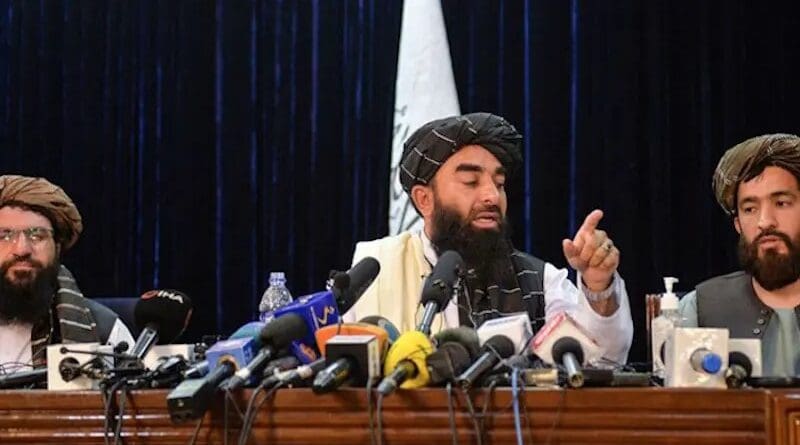Who Will Talk To Afghanistan’s Taliban? – Analysis
By James Durso
On Feb. 18 and 19, United Nations Secretary-General Antonio Guterres convened a meeting in Doha, Qatar, to discuss the “evolving situation” in Afghanistan and future engagement with the Islamic Emirate of Afghanistan. The Taliban declined an invitation to the meeting after the U.N. refused their conditions, including recognizing the Taliban as the legitimate government of Afghanistan.
Guterres reported that the attendees’ “creation of a contact group with a more limited number of states able to have a more coordinated approach in the engagement with the de facto authorities” might include “the P-5 with a group of neighboring countries and a group of relevant donors.” Guterres said he is starting consultations on the appointment of a special envoy “to coordinate engagement between Kabul and the international community.”
The Taliban rejected the need for a special envoy, but Pakistan supported it and specified the envoy must be a “Muslim, experienced diplomat, and from the region.”
Though the West is fixed on the issue of Afghan women and girls, the world needs to engage with the Islamic Emirate on other issues, including water rights, migration, narcotics trafficking and counterterrorism. In many instances, neighbors are already talking directly to the emirate, such as Tashkent’s low-key discussions with Kabul over rights to the water of the Amu Darya, which rises in the Pamir Mountains.
Other countries will also prefer to deal directly with Kabul. China recently appointed a new ambassador to the emirate; Russia will continue its engagement with Kabul; and the Central Asian republics, Iran and Pakistan, as neighboring countries, will not feel the need to use the offices of the envoys, though it will be useful if it can “me-too” their existing positions.
The envoy’s task may be “promoting dialogue between the extremist group and exiled opposition political figures” — that is, the guys the Taliban defeated despite America’s two-decade, $2 trillion sponsorship. In fact, the Taliban and ordinary Afghans are concerned that power sharing will entail the return of the warlords and corrupt officials of the ousted Islamic Republic, according to Obaidullah Baheer of the American University in Afghanistan. If this includes warlords and former Islamic Republic officials, the Taliban’s job will be made much easier.
On the issue of women and girls, the Taliban recently approved female high school graduates to enroll in state-run medical institutes for the new academic year beginning in March, showing that change will come at the Taliban’s pace and will be the result of negotiations between the capital, Kabul and Kandahar, the base of the hard-liners.
The acting interior minister, Sirajuddin Haqqani, and Mullah Yaqoob, acting defense minister, recently warned Hibatullah Akhundzada, Afghanistan’s supreme leader, that reforms must be quickly forthcoming or else there would be consequences. The opportunity to split the Taliban between reformers like Haqqani and Yaqoob and hardline leader Akhundzada may be tempting to Washington, but fostering a civil war will damage Central and South Asia and demonstrate conclusively that Washington is humiliated and spiteful, not patient and constructive.
The envoy may find the going easier if he joins hands with the Organization of Islamic Cooperation (OIC). The OIC has an action plan that addresses the participation of women in all areas of public life; in 2023 the organization announced, “The [OIC] Secretary-General also affirmed the OIC’s determination to continue constructive dialogue to empower Afghan women and guarantee their right to access education at all levels and participate in public life.” The OIC participated in the U.N.’s Doha meeting on Afghanistan.
The OIC can address Afghan women’s rights in an Islamic context and may make better progress than Western governments, which the Taliban consider “the guys we defeated.” With the OIC in the lead, it and the U.N. may be able to convince the Taliban hardliners that women’s rights and education is an Islamic virtue by highlighting women’s contributions to the growing economies of Indonesia and Malaysia, but without taking sides in the Kabul-Kandahar tension.
As to the envoy, though Pakistan would like to fill that role, fraying tiesbetween Pakistan and the Taliban may limit his effectiveness. A better candidate would be from Central Asia, which has diplomats experienced in dealing with the Taliban, or Turkey, the only NATO member with a diplomatic presence in Kabul.
Uzbekistan has strongly supported the Trans-Afghan railway and recently secured Qatar’s financial support for the project. In 2018, Tashkent publicly encouraged the Taliban to start peace negotiations with the Afghan government, and it recently offered technical assistance to the emirate’s Qosh Tepe Canal and warned the Taliban of the potential for leaks. (The U.S. Bureau of Reclamation found that each dollar spent on canal maintenancesaves ten to twelve dollars of water.) And the Uzbeks were right: in December 2023, the canal walls apparently failed and spilled enough water to form a nine-kilometer lake in the desert.
Turkey never cut off relations with Afghanistan, and has increased engagement since August 2021. Ankara has hosted visits by senior Taliban officials and provided emergency aid to the emirate; it also encouraged an inclusive government in Kabul, and education for girls. In 2022, Turkey completed the second phase of the Kajaki dam hydropower project. Ankara has also maintained trade links with the emirate (2022 exports were just under $270 million.)
The envoy will have to fight to get on the Taliban foreign minister’s calendar. Seventeen countries maintain embassies in Kabul, the latest being Azerbaijan, which officially opened its embassy on Feb. 15. And, on Jan. 29, the emirate convened a conference in Kabul attended by representatives of 11 countries, including Russia, India, China, Pakistan, Turkmenistan, Kazakhstan and Uzbekistan. The conference underlined the fact that, while the U.S. and Europe are staying away, Afghanistan’s neighbors are pragmatically seeking to engage the emirate.
Successful engagement with the Islamic Emirate will be a group effort and, if the U.N. envoy materializes, a sure path to success may be via a partnership with the OIC.
This article was published at The Hill

